| |
|
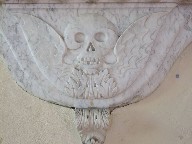 |
|
Framsden is a quiet little
village, not far from the great bulk of
Helmingham Hall; in fact, Helmingham
village school is between the two
villages. The houses cluster along the
single street, among them a corrugated
iron village hall and the Doberman pub.
The church is close by, and you cross a
little bridge from the north, through one
of Suffolk's best lych-gates, the gates
lettered in Gothic script Enter into his
Gates with Thanksgiving. The church sits
on rising ground, the tower similar to
that of Helmingham.
The south porch was restored by Munro
Cautley in the 1940s, one of his last
jobs for the Diocese. The nave and south
aisle are mainly 14th century, although
the hammerbeam roof is later. The font is
rather battered, and in the south aisle
there is a rustic 17th Century memorial
to William Stebbing, but otherwise the
nave and aisle are rather plain and
empty, as if not used often - which they
probably aren't, as the chancel is
separated from the nave by a curtain. |
You
step through this into to the chancel. This is
also 14th century, although extensively restored
in the 19th century. Mortlock found a Saxon
carving of a face in the window surround,
suggesting an earlier church on the site. The
current building was probably the gift of the
Tollemaches who still live, as they did then, at
Helmingham Hall. The chancel is homely and
pleasant, as if it is the real heart of the
building. And in the sanctuary there is an
ancient wonder. The seats to the north of the
altar cannot be in their original place in the
church, and may not even be from this church at
all of course, but if you lift the seats up, and
you will find some of Suffolk's best misericord
carvings, albeit in a county not abundant in
them. There are five, and perhaps the best shows
a saint donating a church with a pelican on
either side. Another shows part of an
Annunciation scene. They have been mutilated,
probably at the time of the Reformation - it
looks as though someone came with an axe and took
a swipe at each one.
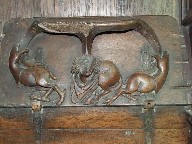 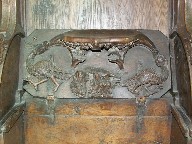 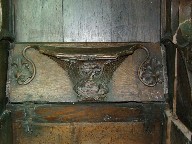 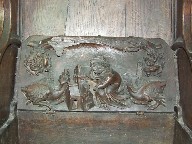 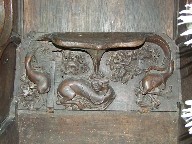
| St Mary is as unsuitable for
the day-to-day life of its parish as any
large medieval building. The decision to
use only part of it is at once realistic
and discouraging, but I was pleased to
find, coming back after twelve years,
that the nave seemed in better care and
condition now than it had then. I
remembered my conversation with the
churchwarden back in 1999. She was
interested to know what I thought of the
misericords. She was as angry about the
mutilation as if it had happened
yesterday, illustrating graphically how
it had happened with the mime of a swipe.
I told her I had just come from Helmingham
church, home of the outrageous Tollemache
tombs. "That's not a church",
she growled. "It's a
mausoleum". How
lovely, that in the last years of the
twentieth century, two neighbouring
Suffolk villages could still indulge in
rivalry about their churches.
|
|
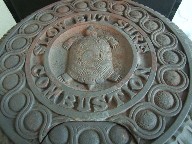 |
|
|
|

